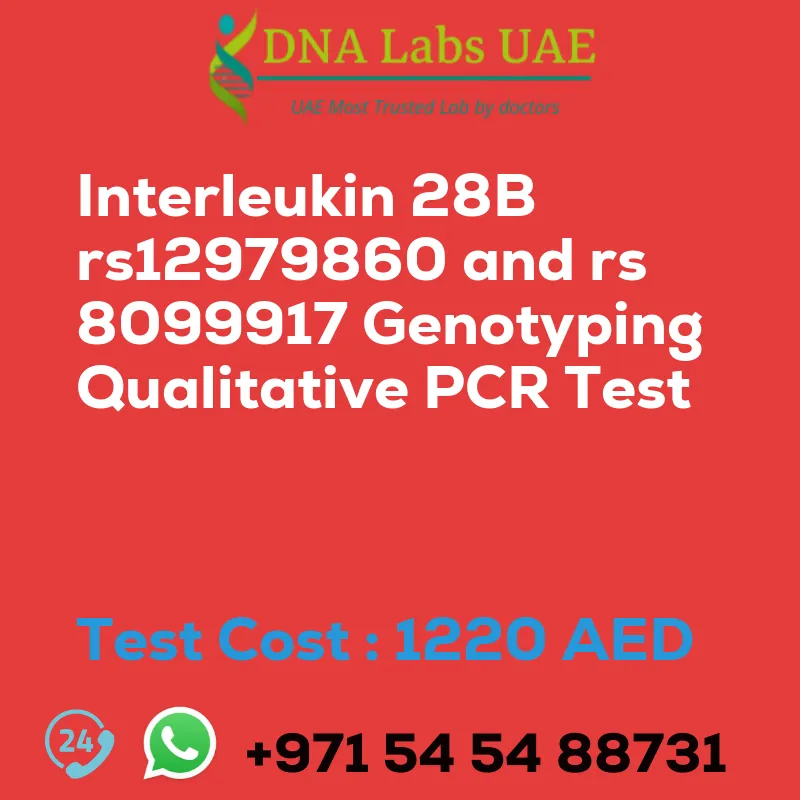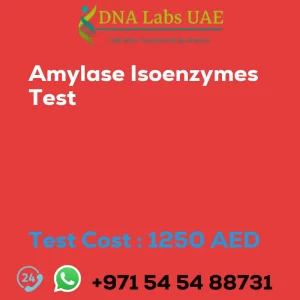INTERLEUKIN 28B rs12979860 and rs 8099917 GENOTYPING QUALITATIVE PCR Test
Test Name: INTERLEUKIN 28B rs12979860 and rs 8099917 GENOTYPING QUALITATIVE PCR Test
Components: Price: 1220.0 AED
Sample Condition: 3 mL (2 mL min.) whole blood from 1 Lavender Top (EDTA) tube. Ship refrigerated. DO NOT FREEZE.
Report Delivery: Sample Thu / Mon by 9 am; Report Sat / Wed
Method: Real Time PCR
Test type: Disorders of Liver
Doctor: Gastroenterologist
Test Department: MOLECULAR DIAGNOSTICS
Pre Test Information: No special preparation required
Test Details: The INTERLEUKIN 28B rs12979860 and rs8099917 genotyping qualitative PCR test is a laboratory test that is used to determine the genotype of an individual for these specific genetic variations.
Interleukin 28B (IL-28B) is a gene that plays a role in the immune response against viral infections, particularly hepatitis C virus (HCV) infection. Variations in the IL-28B gene, specifically the rs12979860 and rs8099917 single nucleotide polymorphisms (SNPs), have been associated with different treatment outcomes and disease progression in individuals with HCV infection.
The qualitative PCR test detects the presence or absence of specific genetic variations (alleles) at the rs12979860 and rs8099917 loci. This information can help determine the individual’s response to antiviral therapy, as certain genotypes have been associated with better treatment response and higher rates of spontaneous clearance of HCV infection.
The test is performed by extracting DNA from a sample, usually from blood or saliva, and amplifying the specific regions of the IL-28B gene that contain the rs12979860 and rs8099917 SNPs using the polymerase chain reaction (PCR) technique. The amplified DNA fragments are then analyzed to determine the genotype of the individual at these loci.
The results of the genotyping test can be reported as different genotypes, such as CC, CT, or TT for rs12979860, and TT, TG, or GG for rs8099917, depending on the specific alleles detected. These genotypes can provide valuable information for personalized treatment decisions in individuals with HCV infection.
| Test Name | INTERLEUKIN 28B rs12979860 and rs 8099917 GENOTYPING QUALITATIVE PCR Test |
|---|---|
| Components | |
| Price | 1220.0 AED |
| Sample Condition | 3 mL (2 mL min.) whole blood from 1 Lavender Top (EDTA) tube. Ship refrigerated. DO NOT FREEZE. |
| Report Delivery | Sample Thu / Mon by 9 am; Report Sat / Wed |
| Method | Real Time PCR |
| Test type | Disorders of Liver |
| Doctor | Gastroenterologist |
| Test Department: | MOLECULAR DIAGNOSTICS |
| Pre Test Information | No special preparation required |
| Test Details |
The INTERLEUKIN 28B rs12979860 and rs8099917 genotyping qualitative PCR test is a laboratory test that is used to determine the genotype of an individual for these specific genetic variations. Interleukin 28B (IL-28B) is a gene that plays a role in the immune response against viral infections, particularly hepatitis C virus (HCV) infection. Variations in the IL-28B gene, specifically the rs12979860 and rs8099917 single nucleotide polymorphisms (SNPs), have been associated with different treatment outcomes and disease progression in individuals with HCV infection. The qualitative PCR test detects the presence or absence of specific genetic variations (alleles) at the rs12979860 and rs8099917 loci. This information can help determine the individual’s response to antiviral therapy, as certain genotypes have been associated with better treatment response and higher rates of spontaneous clearance of HCV infection. The test is performed by extracting DNA from a sample, usually from blood or saliva, and amplifying the specific regions of the IL-28B gene that contain the rs12979860 and rs8099917 SNPs using the polymerase chain reaction (PCR) technique. The amplified DNA fragments are then analyzed to determine the genotype of the individual at these loci. The results of the genotyping test can be reported as different genotypes, such as CC, CT, or TT for rs12979860, and TT, TG, or GG for rs8099917, depending on the specific alleles detected. These genotypes can provide valuable information for personalized treatment decisions in individuals with HCV infection. |







